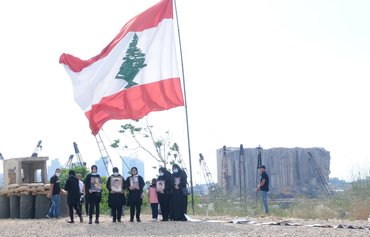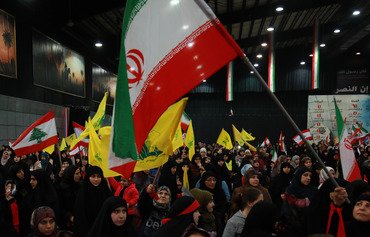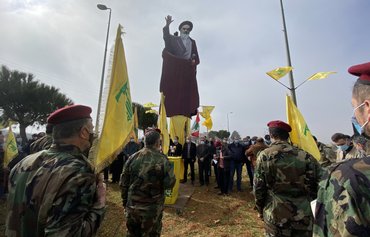SYDNEY -- Australia on Wednesday (November 24) listed Lebanese Hizbullah as a "terrorist organisation" in its entirety, joining a growing list of countries that have outlawed the Iran-backed militant group.
At least 26 countries have blacklisted Hizbullah to date, including the United Kingdom, which banned it in 2019, and Germany, which followed suit in 2020.
The United States designated the group as a foreign terrorist organisation in 1997, and has continued to encourage other nations and entities to take significant steps to designate, restrict or ban Hizbullah as well.
The Arab League, Gulf Co-operation Council (GCC) and European Union (EU) are among the entities that ban all or part of the group.
![Hizbullah elements November 11 raise party flags as they mark an annual commemoration of a suicide attack against Israeli forces in the Marjayoun region of southern Lebanon. [Mahmoud Zayyat/AFP]](/cnmi_am/images/2021/11/24/32825-Hizbullah-flags-Lebanon-600_384.jpg)
Hizbullah elements November 11 raise party flags as they mark an annual commemoration of a suicide attack against Israeli forces in the Marjayoun region of southern Lebanon. [Mahmoud Zayyat/AFP]
Hizbullah "continues to threaten terrorist attacks and provide support to terrorist organisations" and poses a "real" and "credible" threat to Australia, said Australian Home Affairs Minister Karen Andrews.
Hizbullah is part political party and part militia -- the only group in Lebanon to have refused to disarm since the civil war ended in 1990.
It plays a pivotal role in Lebanese politics, and has been accused of fuelling Syria's war by sending thousands of fighters across the border to prop up the regime of Bashar al-Assad, in violation of Lebanon's policy of dissociation.
Lebanon adopted that policy of dissociation in the 2012 Baabda Declaration, on which Hizbullah later reneged. Lebanon was seeking to ensure it would not become an arena for regional conflicts.
Hizbullah operative Salim Ayyash in August 2020 was found guilty in absentia of murder and terrorism in connection with the devastating February 14, 2005, suicide bombing that killed former prime minister Rafik al-Hariri and injured 226 others.
More recently, the party has been accused of blocking investigations of the cataclysmic August 2020 Beirut port explosion, with violence erupting on October 14 as armed Hizbullah and Amal militiamen stormed through the streets of the city.
The violence increased calls for militias in Lebanon to disarm, in accordance with a number of United Nations Security Council resolutions.
'Long overdue'
Some countries have sought to distinguish between Hizbullah's political and militant factions, fearing a blanket ban could further destabilise Lebanon and hamper contacts with authorities.
But others stress the party's political and militant wings are one and the same.
Australia had such a policy since 2003, when it banned Hizbullah's so-called External Security Organisation -- a part of the movement's military wing that is chiefly focused on shadowy overseas operations.
From now, membership of the entire organisation or providing funding for it will be proscribed in Australia, which has a large Lebanese community.
No reason was given for the timing of Canberra's decision, which comes as Lebanon reels from spiralling political and economic crises, with almost 80% of the population estimated to be living below the poverty line.
Elections are expected in March 2022, and public anger is growing about nepotism and corruption among Lebanon's ruling class.
The move was "long overdue", said Matthew Levitt, a former US counter-terrorism financing official now with the Washington Institute for Near East Policy.
In June, he testified to the Australian parliament that the previous designation was "insufficient", adding, "Hizbullah is structured and operates as a singular organisation."
"In recent years a laundry list of Hizbullah terrorist plots and illicit financial schemes have involved Australian citizens and/or activities on Australian soil," he said.

![A member of Lebanese Hizbullah carries his gun during a funeral in Beirut on October 15, a day after a rally organised by the party and the allied Amal movement degenerated into violence. [Ibrahim Amro/AFP]](/cnmi_am/images/2021/11/24/32824-Hizbullah-element-gun-600_384.jpg)







The state and Hizbullah are one!
Reply5 Comment(s)
100/100 true.
Reply5 Comment(s)
The terrorist Hizbullah dominates Lebanon.
Reply5 Comment(s)
If we look at extremism and terrorism today, we will find that Israel is the number one country in terms of extremist and terrorist operations and assassinations. Just look at the time since the creation of Israel until now: there are thousands of killings and assassinations and hundreds of massacres. This has taken place in plain view of the entire world. However, the world is hypocrite and a liar and knows nothing about truth. It’s an unjust world. The world now is closer to destruction than reform and survival.
Reply5 Comment(s)
Hizbullah should have been designated a terrorist organisation a long time ago. Why has everyone been silent about that party for that long? All countries must put an end to this party, disarm it and finish it politically.
Reply5 Comment(s)